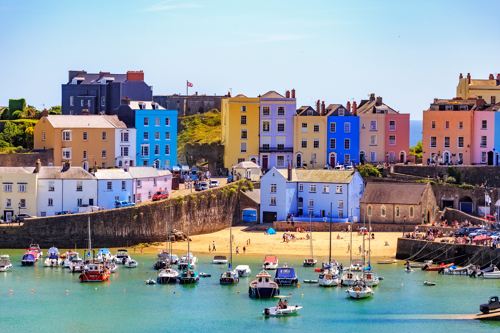On 15 May 2025, the Finance Committee considered amendments tabled during Stage 2 of the Visitor Accommodation (Register and Levy) Etc. (Wales) Bill. 159 amendments were tabled with 98 amendments being agreed. 88 of the amendments agreed were tabled by the Welsh Government with 10 proposed by the Welsh Conservative’s Sam Rowlands MS.
The Bill would give local authorities in Wales a power to charge a levy on overnight visitors staying in visitor accommodation in their area. The levy would be a per person per night charge with local authorities deciding whether to introduce it following consultation with their communities and local businesses.
The Bill also establishes a register of visitor accommodation providers operating in Wales. Providers are required to register, regardless of whether the local authority area they are operating in has implemented the levy.
We’ve published a summary of changes at Stage 2, which provides more details of the amendments made to the Bill at Stage 2. This stage involved the consideration of amendments to the Bill by the Finance committee.
What are the key changes?

Higher rate increased
Although the levy would be charged at the lower rate of 75p for people camping or staying in a hostel or dormitory, the higher rate was raised by 5p to £1.30 per person per night for all other visitor accommodation at Stage 2.
Omission of premium
The Bill as introduced made provisions for a local authority to add a premium onto the lower and higher rates of the levy on the same day as introducing the levy. This power has been omitted from the Bill at Stage 2.
Instead, section 33 was introduced into the Bill at Stage 2 which would enable Welsh Ministers to permit local authorities to add an additional amount to the levy but no earlier than 12 months after the levy is introduced.
During Stage 2 proceedings the Cabinet Secretary noted:
The 12 months that we are introducing here will give us time to continue to explore those issues [of flexibility in terms of when or where an additional amount could be implemented] and see whether in regulations we will want to fine-tune the approach that we have developed up until now.
Exemptions
The absence of an exemption for children and young people from being charged the levy was a concern for stakeholders such as the British Holiday and Home Park Association and the Youth Hostel Association who cited that certain European countries administering a tourist tax exempt children and young people from paying the tax.
The Finance Committee recommended that, in advance of the Stage 1 debate, the Welsh Government should provide the Senedd with a summary of any analysis carried out regarding the potential exemption from the levy in relation to under-16s and educational trips.
During the Stage 1 debate on the general principles of the Bill, the Cabinet Secretary for Finance and Welsh Language, Mark Drakeford MS, responded to the recommendation, saying:
However, I can inform Members this afternoon that, having read the committee's report and having considered again the evidence presented to it, I have decided to go further than the recommendation itself. At Stage 2, I will bring forward a Government amendment to exempt under-18-year-olds staying at lower rated accommodation from the levy altogether.
Consequently, the Welsh Government introduced an amendment to exempt persons under the age of 18 from the lower rate of the levy. During Stage 2 proceedings, the Cabinet Secretary said:
This provides a targeted amendment, and our evidence tells us that it removes a large portion of educational types of stays and stays arranged by youth organisations.
He added:
It will also benefit families accessing these more affordable accommodation types, and, in that way, this is a more progressive approach compared to a complete exemption from the levy for children and young people.
Levy partnership forum
One of the Committee’s key findings was whether the revenue collected by the levy would create additionality (extra money) for the tourist sector instead of replacing funding already allocated to the sector by local authorities.
To help address these concerns and ensure stakeholders could influence how the levy revenue is allocated, the Finance Committee recommended the Welsh Government should bring forward amendments at Stage 2 requiring principal councils wishing to introduce the levy to establish a Visitor Forum.
During the Stage 1 debate on the general principles of the Bill, the Cabinet Secretary said:
I hope to work with the committee so that an amendment can be brought forward at Stage 2 to ensure that there are effective partnership arrangements between principal councils, businesses and local communities in deciding how best to allocate visitor levy revenues.
Sam Rowlands MS tabled amendments to make it mandatory for local authorities to take reasonable steps to establish a levy partnership forum within three months of the levy coming into effect. An important function of the forum would be to advise on how revenue from the levy is spent to support the local community.
The local authority would also be required to take steps to ensure the forum includes stakeholders from the tourism sector and visitor accommodation in the area.
Other amendments
The Bill as introduced would require visitor accommodation providers to charge the levy on a person’s arrival. This was changed at Stage 2 to a person’s departure.
The period for claiming a repayment has been extended to three months after the end of the stay.
Further detail on the other amendments made to the Bill at Stage 2 can be found in our summary of changes at Stage 2.
What happens next?
The Bill is currently at Stage 3, which means it will be considered by the whole of the Senedd and is subject to amendment by every Member of the Senedd in Plenary. You can watch it on Senedd.tv on Tuesday 1 July.
Article by Christian Tipples, Senedd Research, Welsh Parliament.






